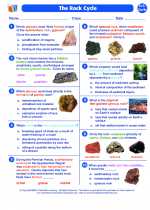The Rock Cycle -> potential energy
Potential Energy
Potential energy is the energy that an object possesses due to its position or state. It is stored energy that has the potential to do work. There are several types of potential energy, including gravitational potential energy, elastic potential energy, chemical potential energy, and electrical potential energy.
Gravitational Potential Energy
Gravitational potential energy is the energy an object possesses due to its position in a gravitational field. It is calculated using the formula:
PE = mgh
Where PE is the gravitational potential energy, m is the mass of the object, g is the acceleration due to gravity, and h is the height of the object above a reference point.
Elastic Potential Energy
Elastic potential energy is the energy stored in elastic materials when they are stretched or compressed. It is calculated using the formula:
PE = 0.5 k x^2
Where PE is the elastic potential energy, k is the spring constant, and x is the displacement from equilibrium position.
Chemical Potential Energy
Chemical potential energy is the energy stored in the bonds of chemical compounds. When chemical reactions occur, this energy can be released or absorbed. Examples of chemical potential energy include the energy stored in food, fuels, and batteries.
Electrical Potential Energy
Electrical potential energy is the energy stored in an electric field. It is calculated using the formula:
PE = qV
Where PE is the electrical potential energy, q is the charge, and V is the electric potential.
Study Guide
- Understand the concept of potential energy and its different forms.
- Be able to calculate gravitational potential energy using the formula PE = mgh.
- Be able to calculate elastic potential energy using the formula PE = 0.5 k x^2.
- Be familiar with examples of chemical potential energy and how it is related to chemical reactions.
- Understand the concept of electrical potential energy and how it is related to electric fields.
[Potential Energy] Related Worksheets and Study Guides:
.◂Earth Science Worksheets and Study Guides High School. The Rock Cycle

 Worksheet/Answer key
Worksheet/Answer key
 Worksheet/Answer key
Worksheet/Answer key
 Worksheet/Answer key
Worksheet/Answer key
 Vocabulary/Answer key
Vocabulary/Answer key
 Vocabulary/Answer key
Vocabulary/Answer key
 Vocabulary/Answer key
Vocabulary/Answer key
